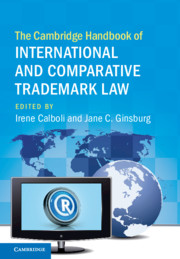Book contents
- The Cambridge Handbook of International and Comparative Trademark Law
- The Cambridge Handbook of International and Comparative Trademark Law
- Copyright page
- Contents
- Editors and Contributors
- Foreword
- Preface
- Part One International Aspects of Trademark Protection
- Part Two Comparative Perspectives on Trademark Protection
- I The Nature and Functions of Trademarks
- II Signs That Can Be Protected as Trademarks
- III Public Policy Limitations of Trademark Subject Matter
- IV The Relationship between Trademarks and Geographical Indications
- 15 Sui Generis or Independent Geographical Indications Protection
- 16 Does the Unfair Competition Approach to Geographical Indications of Origin Have a Future?
- V Certification and Collective Marks
- VI The Relationship between Trademark Law and Advertising Law
- VII The Relationship between Trademark Law and the Right of Publicity
- VIII Trademarks and Domain Names
- IX Overlapping Rights
- X Theories Underlying the Standards for Trademark Infringement
- XI Trademark Dilution
- XII Secondary Trademark Liability
- XIII Trademark Defenses
- XIV The Principle of Exhaustion of Trademark Rights
- XV Trademark Transactions
- Index
16 - Does the Unfair Competition Approach to Geographical Indications of Origin Have a Future?
from IV - The Relationship between Trademarks and Geographical Indications
Published online by Cambridge University Press: 18 September 2020
- The Cambridge Handbook of International and Comparative Trademark Law
- The Cambridge Handbook of International and Comparative Trademark Law
- Copyright page
- Contents
- Editors and Contributors
- Foreword
- Preface
- Part One International Aspects of Trademark Protection
- Part Two Comparative Perspectives on Trademark Protection
- I The Nature and Functions of Trademarks
- II Signs That Can Be Protected as Trademarks
- III Public Policy Limitations of Trademark Subject Matter
- IV The Relationship between Trademarks and Geographical Indications
- 15 Sui Generis or Independent Geographical Indications Protection
- 16 Does the Unfair Competition Approach to Geographical Indications of Origin Have a Future?
- V Certification and Collective Marks
- VI The Relationship between Trademark Law and Advertising Law
- VII The Relationship between Trademark Law and the Right of Publicity
- VIII Trademarks and Domain Names
- IX Overlapping Rights
- X Theories Underlying the Standards for Trademark Infringement
- XI Trademark Dilution
- XII Secondary Trademark Liability
- XIII Trademark Defenses
- XIV The Principle of Exhaustion of Trademark Rights
- XV Trademark Transactions
- Index
Summary
There is appeal to the platonic concept of the Geographical Indication of origin (GI): that certain geographical locations may, through natural conditions (climate, soil, water, etc.) and/or localised tradition and artisan know-how, become peculiarly associated with distinctive high-quality produce, and that consumers benefit from understanding and valuing these unique peculiarities from all over the world. Law reflecting this ideal would ensure only local practitioners could invoke that association to attract a premium for their products and prevent misappropriation by unconnected interlopers. In theory at least, such a system could satisfy natural justice by rewarding those who practise and preserve cultural heritage; confer legal rights consistent with more historically Western concerns to provide incentives for investment in quality; and banish deception. The collective nature of these rights, tied to places and peoples rather than individuals, and not purely proprietary in the markets-and-transfer sense,1 would find support outside Western traditions.
- Type
- Chapter
- Information
- Publisher: Cambridge University PressPrint publication year: 2020

